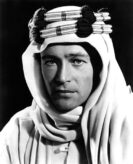Funny how random thoughts and recollections pop into your memory unbidden at the most inappropriate moments. I was day-dreaming recently (its an age thing) when I remembered hearing an amusing sketch based on life in the RAF in the 1920’s which – if I recall it correctly – went something like this: a Corporal requests an interview with his Flight Commander who asks him what is bothering him.
“Well Sir, its this new recruit in my section Sir, Aircraftman Shaw.” “Yes, what about him? Is he causing trouble?” “No Sir, its not that. He’s just a bit odd, and doesn’t seem to fit in with the rest. I can’t seem to put my finger on it.” “Out with it Corporal, what’s really bothering you?” “Well Sir, I think he’s actually Lawrence  of Arabia.”
of Arabia.”
Apart from bringing a smile to my face, it got me thinking about Names and their importance in the world we live in. For history buffs Lawrence tried to seek seclusion by enlisting in the RAF and also the Royal Tank Regiment using two different names (Ross and then Shaw) to conceal his identity. The point being that our name is the single most important form of identity we possess. It is used on our entry into this world; when we get married and/or divorced; and when we die. Vast databases are dedicated to recording these unique monikers as I personally discovered when I began my researches at the National Archives in Kew. One’s name is almost a guarantee of the truth of our existence; a signpost highlighting the very fact of our being; and an affirmation of our life.
And yet, as we have seen in the case of Lawrence, people can and do assume alternate names – for whatever reason – thereby throwing a curtain of doubt over what we naively imagined was a statement of incontrovertible fact. No-one is more susceptible to this simple deception than those who make their living by writing. Indeed, a quick check of literary aliases will leave you gasping at the sheer number who choose to indulge in this common deceit. As a frustrated scribbler myself I felt I just might learn something to my advantage if I carried out a cursory check on some notable miscreants.
Let’s start with an easy one. Joseph Conrad (real name Jozef Teodor Konrad Korrzeniowski) clearly did it to Anglicize his all-too-foreign name and make himself more acceptable to the English (notoriously suspicious of Johnny Foreigner). On the other hand, quite why a true blue Englishman like Charles Dickens should choose to publish himself as simply Boz is something of a mystery. In the case of George Eliot in 1857 (real name Mary Ann Evans) one assumes it was to make her work more acceptable to the male readership of the times. Incidentally she also chose for her nom de plume the real name of her (male) lover!
The reasons behind the changes are sometimes somewhat bewildering. Neville Shute was born Neville Norway which makes the decision to make so minor a change hard to discern, unless of course he had something against that lovely Scandinavian country. George Orwell (actually Eric Arthur Blair) named himself after a river which is a good an excuse as many. The author of ‘Alice in Wonderland’ (Charles Lutwidge Dodgson) settled for Lewis Carroll which was probably easier to remember and to say. I can’t resist a local favourite of mine. Edith Pargeter, who was born and lived in Telford, became Ellis Peters, the author of the Cadfael series – Shrewsbury’s answer to Inspector Morse.
I could go on, but you get the drift. The point is that we simply cannot trust that the name shown on the cover really is the real name of the author. Does it matter? Probably not, although one wonders why do it in the first place. Is it to conceal one’s identity; to make one’s work more attractive to the reading public; to scratch an itch to replace your run-of-the-mill birth name with something more exotic; or what?
Its probably a bit too late for me, but I can’t help wondering if I could have been more commercially successful if Peter Gordon Culley had been replaced with something more exciting. How about Callum Angus MacGregor (with a whiff of tartan and whisky). Or maybe Pierre Jules La Rochelle (if La Belle France is your cup of tea). Lastly, there is always Mikhail Aleksandr Romanov (following in the footsteps of Boris Pasternak). We shall probably never know, but the prospect of an intriguing new identity is something to think about. Watch this space.
« Coincidences – Vivian Oliver – (38th Entry) || The Getting of Wisdom – Peter Culley (29th) »